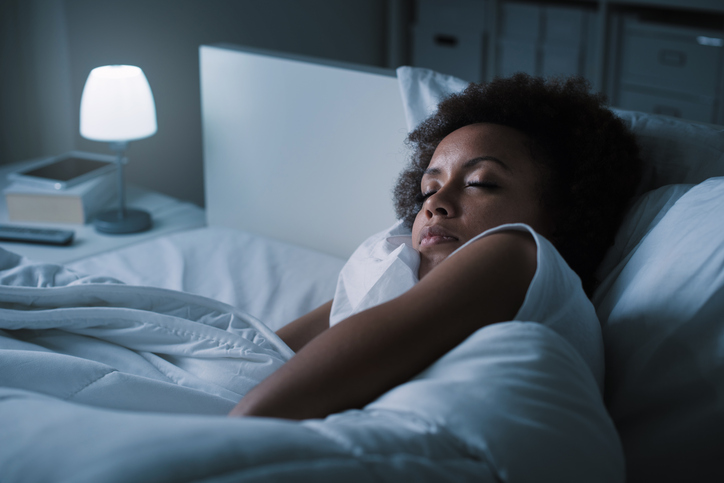1. Prioritise relaxing activities in the few hours before you go to bed
This will reduce your stress levels and get your body into a calm state ready for sleeping.
2. Follow a soothing bedtime routine – and importantly calm your mind
Have a warm bath with Epsom salts and lavender oil or listen to relaxing music.
You could try calming your beta brain waves and improving Alpha activity. Alpha waves are the ‘frequency bridge’ between our conscious thinking (Beta) and subconscious (Theta) mind. In a state of stress, a phenomenon called ‘Alpha blocking’ can occur which involves excessive Beta activity and little Alpha activity.
New York psychiatrist Dr Galina Mindlin uses ‘brain music’ – rhythmic sound patterns derived from recordings of her patients’ own brain waves – to help overcome insomnia and depression. Excellent results have been reported with John Levine’s Silence of the Peace CD which induces alpha brain waves that help quieten the mind and encourage restful sleep.
3. Follow a good sleep hygiene routine
Ensuring your bedroom is quiet and dark and you are comfortable. Essentially common sense advice, rather quaintly known as ‘sleep hygiene’, forms part of most sleep regimes. The idea is to create regular sleep-promoting habits to generate more confidence and less to worry about when going to sleep. You are advised to keep your bedroom quiet and dark, to wear comfortable night clothes, not to have a big meal before going to bed, to avoid coffee and alcohol and to exercise regularly but not within three hours of bedtime.
It’s also worth knowing that certain prescription medications – such as steroids, bronchodilators (used for asthma) and diuretics – can cause insomnia. And if you drink caffeinated drinks, research shows that consumption within six hours of bedtime can have significant disruptive effects on sleep. Although sleep hygiene is widely recommended, there have been very few studies of it as an individual treatment. Good results have been reported,
4. Once in bed, do some simple relaxation exercises to get yourself ready for sleep.
Try Heart Math to reduce the negative impact of stress and build your resilience.
5. Try stimulus control therapy
Essentially, this involves ensuring that only the bed is associated with sleeping. So, patients are advised against having naps, to go to bed when they feel sleepy, to get up again within 20 minutes if they haven’t fallen asleep, to do something relaxing until they feel drowsy and then try again but to get up once more if they still fail to fall asleep.
6. Manage technology
There is also a growing body of evidence that suggests electromagnetic radiation
from mobile phones and wireless internet connections (wi-fi) can interfere with melatonin production. For example, in one small study, melatonin levels were 44 per cent lower at 2 a.m in those exposed to mobile phone signals, compared to those who weren’t.
Recent research has identified that signals can affect you up to 5 metres away and in many homes bedrooms are above living rooms and often therefore digital wi-fi routers.
So it might be worth turning off your mobile and any wi-fi routers at night to see if this improves your quality of sleep.
7. Manage light, especially LED light
Keep artificial light to a minimum in the bedroom because being exposed to bright light can inhibit production of the sleep hormone melatonin, which peaks at around 1 a.m.
Fluorescent bulbs and light-emitting diodes (LEDs) have taken over lighting because they are more energy efficient and can provide better lighting than incandescent bulbs. But while these bulbs are helpful in many ways, they can also have a negative effect on sleep.
Research has found that exposure to blue light suppresses the production of melatonin more than any other type of light. It is believed that the shorter wavelengths in blue light is what causes the body to produce less melatonin because the body is more sensitive to this type of light. They are found in everything from task lighting to televisions to smartphones, so pay attention to your evening use of light and technology.
8. If you’re still struggling – there is extra help
You can buy melatonin as an over-the-counter medicine in the United States, or on prescription in the UK. Alternatively, you can supplement 5-HTP, an amino acid that your body uses to make melatonin. Research shows that supplementing 200mg of 5-HTP half an hour before bed improves sleep. (But don’t take 5-HTP if you are also taking SSRI antidepressant drugs, unless under supervision from a doctor or nutritional therapist, as 5-HTP can increase levels of serotoninSerotonin is a hormone found naturally in the brain and digestive tract. It is often referred to as the ‘happy hormone’ as it influences mood…..)
Several minerals and vitamins are also involved in getting a good night’s sleep. CalciumWhat it does: Promotes a healthy heart, clots blood, promotes healthy nerves, contracts muscles, improves skin, bone and dental health, relieves aching muscles and bones,… and particularly magnesiumWhat it does: Strengthens bones and teeth, promotes healthy muscles by helping them to relax, also important for PMS, important for heart muscles and nervous… are calming and aid muscle relaxation. Being highly stressed or eating a lot of sugar lowers levels of magnesium, which is found in seeds, nuts, green vegetables and seafood; calcium is in these foods, too, and in dairy produce. Try supplementing 400mg of magnesium before bed. This can be especially helpful if you tend to wake up in the night with stiff muscles.
Further Information
For more guidance on how to reduce stress and sleep well read The Stress Cure, co-authored with Susannah Lawson. You can find natural support for sleep at HOLFORDirect. My formula Chill Food can be taken 30 minutes before going to bed, and also the drink Cherry Active by Active Edge which I am a great proponent of, and can also be taken before bedtime.


Comments
Join the Conversation on our Facebook Page